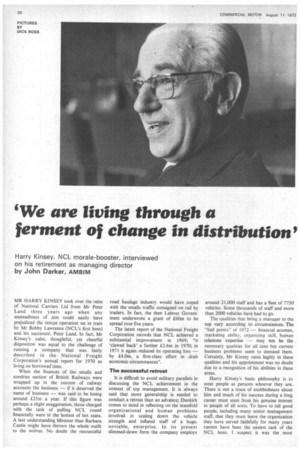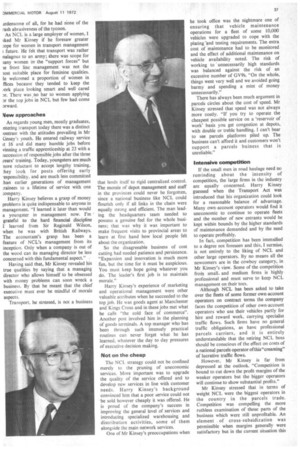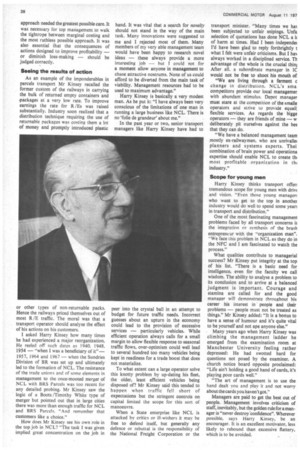'We are living through a ferment of change in distribution'
Page 38

Page 39

Page 40

If you've noticed an error in this article please click here to report it so we can fix it.
Harry Kinsey, NCL morale-booster, interviewed on his retirement as managing director by John Darker, AMBIM
MR HARRY KINSEY took over the reins of National Carriers Ltd from Mr Peter Land three years ago when any unsteadiness of aim could easily have prejudiced the rescue operation set in train by Mr Bobby Lawrence (NC L's first boss) and his successor, Peter Land. In fact, Mr Kinsey's calm, thoughtful, yet cheerful disposition was equal to the challenge of running a company that was fairly described in the National Freight Corporation's annual report for 1970 as living on borrowed time.
When the finances of the smalls and sundries section of British Railways were wrapped up in the cocoon of railway accounts the business — if it deserved the name of business — was said to be losing around £25m a year. If this figure was perhaps a slight exaggeration, those charged with the task of pulling NCL round financially were in the hottest of hot seats. A less understanding Minister than Barbara Castle might have thrown the whole outfit to the wolves. No doubt the resourceful road haulage industry would have coped with the smalls traffic consigned on rail by traders. In fact, the then Labour Government underwrote a grant of 160m to be spread over five years.
The latest report of the National Freight Corporation records that NCL achieved a substantial improvement in 1969; "it 'clawed back' a further £3.6m in 1970; in 1971 it again reduced its operating loss — by £4.0m, a first-class effort in drab economic circumstances".
The successful retreat
It is difficult to avoid military parallels in discussing the NCL achievement in the context of top management. It is always said that more generalship is needed to conduct a retreat than an advance; Dunkirk comes to mind in reflecting on the manifold organizational and human problems involved in scaling down the vehicle strength and inflated staff of a huge, unviable, enterprise. In its present slimmed-down form the company employs around 21,000 staff and has a fleet of 7750 vehicles. Some thousands of staff and more than 2000 vehicles have had to go.
The qualities that bring a manager to the top vary according to circumstances. The "bull points" of 1972 — financial acumen, marketing ability, organizing skill, human relations expertise — may not be the necessary qualities for all time but current business problems seem to demand them. Certainly, Mr Kinsey rates highly in these qualities and his appointment was no doubt due to a recognition of his abilities in these areas.
Harry Kinsey's basic philosophy is to treat people as persons whoever they are. There is not a trace of snobbishness about him and much of his success during a long career must stem from his genuine interest in people of all sorts. To have to tell good people, including many senior management staff, that they must leave the organization they have served faithfully for many years cannot have been the easiest task of the NCL boss. I suspect it was the most irdensome of all, for he had none of the rash abrasiveness of the tycoon.
As NCL is a large employer of women, I sked Mr Kinsey if he foresaw greater ope for women in transport management future. He felt that transport was rather nalagous to an army; there was scope for 'any women in the "support forces" but le front line management was not the lost suitable place for feminine qualities. le welcomed a proportion of women in ffices because they tended to keep the Tork place looking smart and well cared Dr. There was no bar to women applying 3r the top jobs in NCL but few had come Drward.
New approaches As regards young men, mostly graduates, .ntering transport today there was a distinct :ontrast with the attitudes prevailing in Mr (insey's youth. He entered railway service it 16 and did many humble jobs before vinning a traffic apprenticeship at 23 with a :uccession of responsible jobs after the three years' training. Today, youngsters are much nore reluctant to accept lengthy training, hey look for posts offering early 'esponsibility, and are much less committed :han earlier generations of management sainees to a lifetime of service with one ompany.
Harry Kinsey believes a grasp of money problems is quite indispensable to anyone in management. "I learned it later than would a youngster in management now. I'm grateful to the hard financial discipline I learned from Sir Reginald Wilson, when he was with British Railways. The accountant's grasp has been a feature of NCL's management from its inception. Only when a company is out of the wood can its managing director be less concerned with this fundamental aspect." .
Having said that, Mr Kinsey revealed his true qualities by saying that a managing director who allows himself to be obsessed with money problems can soon wreck a business. By that he meant that the chief executive must ever be mindful of morale aspects.
Transport, he stressed, is not a business that lends itself to rigid centralized control. The morale of depot management and staff in the provinces could never be forgotten, since a national business like NCL could flourish only if all links in the chain were equally strong and efficient. The man leading the headquarters team needed to possess a genuine feel for the whole business; that was why it was important to make frequent visits to provincial areas to learn at first hand how local people felt about the organization.
So the disagreeable business of cost cutting had needed patience and persistence. "Expansion and innovation is much more fun, but the time for it must be auspicious. You must keep hope going whatever you do. The leader's first job is to maintain morale."
Harry Kinsey's experience of marketing and operational management were other valuable attributes when he succeeded to the top job. He was goods agent at Manchester and Kings Cross and in these jobs met what he calls "the cold face of commerce". Another post involved him in the planning of goods terminals. A top manager who has been through such intensely practical routines can never forget what he has learned, whatever the day to day pressures of executive decision making.
Not on the cheap The NCL strategy could not be confined merely to the pruning of uneconomic services. More important was to upgrade the quality of the service offered and to develop new services in line with customer needs. Harry Kinsey's background convinced him that a poor service could not be sold however cheaply it was offered. He is proud of the company's success in improving the general level of services and introducing specialized warehousing and distribution activities, some of them alongside the main network services.
One of Mr Kinsey's preoccupations when he took office was the nightmare one of ensuring that vehicle maintenance operations for a fleet of some 10,000 vehicles were upgraded to cope with the plating andtesting requirements. The extra cost of maintenance had to be monitored and the effect of additional Maintenance on vehicle availability noted. The risk of working to 'unnecessarily high standards was balanced against the risk of an excessive number of GV9's. "On the whole, things went very well and we avoided going barmy and spending a mint of money unnecessarily."
There has always been much argument in parcels circles about the cost of speed. Mr Kinsey stressed that speed was not always more costly. "If you try to operate the cheapest possible service on a 'reservoir of work' basis you get congestion at depots, with double or treble handling. I can't bear to see parcels platforms piled up. The business can't afford it and customers won't support a parcels buiness that is unreliable."
Intensive competition If the small men in road haulage need no reminding about the intensity of competition, the large firms in the industry are equally concerned. Harry Kinsey guessed when the Transport Act was introduced that his organization could look for a reasonable balance of advantage. Many own-account operators would find it uneconomic to continue to operate fleets and the number of new entrants would be kept within bounds by the higher standards of maintenance demanded and by the need to operate profitably.
In fact, competition has been intensified to a degree not foreseen and this, I surmise, is not entirely to the liking of NCL and other large operators. By no means all the newcomers are in the cowboy category, in Mr Kinsey's view. Some of the competition from small. and medium firms is highly professional and must serve to keep NCL management on their toes.
Although NCL has been asked to take over the fleets of some former own-account operators on contract terms the company faces the competition of other own-account operators who use their vehicles partly for hire and reward work, carrying specialist traffic flows. Such firms have no general traffic obligations, as have professional parcels carriers, and it is entirely understandable that the retiring NCL boss should be conscious of the effect on costs of a national parcels operator ofthis "creaming" of lucrative traffic flows.
However, Mr Kinsey is far from depressed at the outlook. "Competition is bound to cut down the profit margins of the weaker operators but the bigger operators will continue to show substantial profits."
Mr Kinsey stressed that in terms of weight NCL were the biggest operators in the country in the parcels trade. Competition was compelling the more ruthless examination of those parts of the business which were still unprofitable. An element of cross-subsidization was permissible when margins generally were satisfactory but in the current situation this approach needed the greatest possible care. It was necessary for top management to walk the tightrope between marginal costing and the most ruthless possible approach. It was also essential that the consequences of actions designed to improve profitability — or diminish loss-making — should be judged correctly.
Seeing the results of action
As an example of the imponderables in parcels transport Mr Kinsey recalled the former custom of the railways in carrying the bulk of returned empty containers and packages at a very low rate. To improve earnings the rate for R /Es was raised substantially. Industry soon realized that a distribution technique requiring the use of returnable packages was costing them a lot of money and promptly introduced plastic or other types of non-returnable packs. Hence the railways priced themselves out of most R/E traffic. The moral was that a transport operator shoUld analyse the effect of his actions on his customers.
I asked Harry Kinsey how many times he had experienced a major reorganization. He reeled off such dates as 1940. 1948. 1954 — "when I was a beneficiary of it"1957, 1964 and 1967 — when the Sundries Division of BR was set up and ultimately led to the formation of NCL. The resistance of the trade unions and of some elements in management to the once-mooted merger of NCL with BRS Parcels was too recent for any detailed probing. Mr Kinsey saw the logic of a Boots /Timothy White type of merger but pointed out that in large cities there was more than enough traffic for NCL and BRS Parcels. "And remember that customers like a choice."
How does Mr Kinsey see his own role in the top job in NCL? "The task I was given implied great concentration on the job in
hand. It was vital that a search for novelty should not stand in the Way of the main task. Many innovations were suggested to me and I rejected most of them. Many members of my very able management team would have been happy to research novel ideas — these always provide a more interesting job -but 1 could not for a moment allow anyone in management to chase attractive nostrums. None of us could afford to be diverted from the main task of viability. Management resources had to be used to maximum advantage."
Harry Kinsey is basically a very modest man. As he put it: "I have always been very conscious of the limitations of one man in running a large business like NCL. There is no 'folk de grandeur' about me."
In the past year or two, senior transport managers like Harry Kinsey have had to peer into the crystal ball in an attempt to budget for future traffic needs. Incorrect guesses about an upturn in the economy could lead to the provision of excessive services — particularly vehicles. While efficient operation always calls for a small margin to allow flexible response to seasonal traffic flows, over-optimism could well lead to several hundred too many vehicles being kept in readiness for a trade boost that does not materialize.
To what extent can a large operator solve this knotty problem by up-dating his fleet, the older, least efficient vehicles being disposed of? Mr Kinsey said this tended to happen when traffic fell short of expectations but the stringent controls on capital limited the scope for this sort of manoeuvre.
When a State enterprise like NCL is attacked by critics or ill-wishers it may he free to defend itself, but generally any defence or rebuttal is the responsibility of the National Freight Corporation or the transport minister. "Many times we has been subjected to unfair snipings. Unfa selection of quotations has done NCL a k of harm at times. Had I been independet I'd have been glad to reply forthrightly t what I felt were unfair criticisms. But I hay always worked in a disciplined service. Th advantage of the whole is the crucial thin! After all, a subordinate manager in IC would not be free to shoot his mouth of
"We are living through a ferment c change in distribution. NCL's sma competitors provide our local managemer with abundant stimulus. Depot manager must stare at the competition of the smalle operators and strive to provide squall: flexible services. As regards the bigge operators — they are friends of mine — w deliberately pit ourselves against the bes that they can do.
"We have a balanced management team mostly ex-railwaymen, who are unrivallei planners and systems experts. Thei combination of brain power and operationa expertise should enable NCL to create tlu most profitable organization in thi industry."
Scope for young men
Harry Kinsey thinks transport offer: tremendous scope for young men with drivt and vision. "Even those young manageri who want to get to the top in another industry would do well to spend some years in transport and distribution."
One of the most fascinating management problems faced by all transport concerns is the integration or synthesis of the brash entreprene ur with the "organization man". "We face this problem in NCL as they do in the NFC and I am fascinated to watch the process."
What qualities contribute to managerial success? Mr Kinsey put integrity at the top of his list. "There is a basic need for intelligence, even for the faculty we call wisdom. The ability to analyse .a problem to its conclusion and to arrive at a balanced judgment is important. Courage and stamina are called for and the good manager will demonstrate throughout his career his interest in ' people and their problems — people must not be treated as things." Mr Kinsey added: "It is a bonus to have a sense of humour and it's quite vital to be yourself and not ape anyone else."
• Many years ago when Harry Kinsey was climbing the management ladder he emerged from the examination room at Manchester University feeling rather depressed: He had swotted hard for questions not posed by the examiner. A church notice board opposite proclaimed: "Life ain't holding a good hand of cards, it's playing poor cards well."
"The art of management is to use the hand dealt you and play it and not worry about the cards you haven't got."
Managers are paid to get the best out of people. Management involves criticism of staff, inevitably, but the golden rule for a manager is "never destroy -confidence". Wherever possible, says Harry Kinsey, be an encourager. It is an excellent motivator, less likely to rebound than excessive flattery, which is to be avoided.




























































































